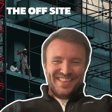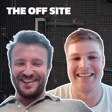Become a Creator today!Start creating today - Share your story with the world!
Start for free
00:00:00
00:00:01

Can New Tools Outshine Primavera P6?
This week on the Off Site Podcast, Greg Lawton returns for the second part of the AI conversation cut short at the end of Greg's last appearance. Alongside that, Jason and Carlos also tackle:
1. The Borumba Pumped Hydro project that's being planned in Queensland.
2. Some of the assumptions technology companies make about the construction industry and whether they're accurate.
Transcript
Brand Names as Task Names
00:00:00
Speaker
we're making the argument for a tool, and one of the greatest tricks that a marketing department can ever pull is replacing the task with the name of the tool. so you know It's a hoover. No, it's not. It's a vacuum. Hoover's a brand. It's a Frisbee. No, it's not. It's a flying disk. Frisbee's a brand. Sorry, just double-click. Frisbees are not actually frisbeees Frisbees. Frisbee's a brand. No idea. It's a brand.
00:00:27
Speaker
Yeah, there you go. That's how good it is.
Introductions and MIT Innovation
00:00:37
Speaker
Welcome back to the podcast. So today we've got Carlos and myself Jason talking to you from a very, very, very rainy ah Queensland, Australia and Carlos from a very, very, very drunk and hungover Dublin Island. Carlos, how you going, mate?
00:00:53
Speaker
Oh, the wave's going to blow down. Just in case, just in case Ollie doesn't get the story about the 11 pints in the colon open, I just thought I'd reinforce it in the intro. So it's definitely making it into the, into the episode.
00:01:07
Speaker
I haven't done a double digit pipe session on a Wednesday since uni and I can't hack it. So yeah, upfront and honest, I'm going to be an absolute drag on this episode. But no, we're all good. Oh, that's good. I'm sure you've prepped and come with your one of your fun facts for the day um and i won't be blogging it.
00:01:27
Speaker
and No, I've actually got a decent one up your alley as a self-proclaimed concrete nerd. A student at MIT has developed 3D printed glass bricks and they interlink like Lego. So all of these standard bricks you can basically build structures.
00:01:47
Speaker
um So like my gut feel is that would be super handy in like maybe emergency situations and things like that where you've got non-skilled individuals potentially trying to build structures really quickly without any experience. um But then I was thinking, shit, there's a lot of energy that goes into producing glass. Is this gonna be even worse than concrete? um But yeah, what's your thoughts as in the concept of a glass bricks,
00:02:17
Speaker
ah that a uni student ah developed Glass Lego. um Yeah,
00:02:27
Speaker
hey there we go big god i ah yeah cool idea. Yeah, I shouldn't throw stones in that house.
00:02:37
Speaker
So, but like like glass glass or some like ah glass derivative thing, like it's is not seen through... Yeah, so article didn't give any like proper technical knowledge on what the actual material is. They call it glass, but... I'm no expert in glass, as people have probably worked. i assume you you are conversation But like the the like but ah temperature, that the heat required to produce glass, suddenly to do it out of a 3D printer, surely it's like laced with plastic. like It's got to be not glass glass.
00:03:11
Speaker
is my professional statement. I think the whole 3D printing thing, for anything that's mass produced, there's like, so I don't know if you've seen a lot of the articles talking about the like whole 3D printing market and all these companies that went public that are like almost gone to zero. You don't hear any more, do you?
00:03:28
Speaker
It's a super, um, interesting method to make one of something, uh, but like a, or like a very small number, but the economics totally suck if you're making yeah lots of them. it makes And if I don't know anything about but Lego, you need lots of them. Yeah. It makes sense for like.
00:03:50
Speaker
like tiny quantity, highly bespoke items. Like I get printing because like you bang in a design and you can get something, but to mass produce something that's the same piece every time is surely a 3D printer isn't the way to go. Horrible. Yeah. You want to, you want to imagine.
00:04:07
Speaker
Yeah, I'm guessing the innovation is actually the fact that it's 3D printed in glass rather than the fact that it's a brick that you could build something with. um Because I've not seen glass in that context. but Because it's translucent. You've famously got to be careful about glass because it's one of those ones that you can't see. It'll really sneak up on you.
00:04:29
Speaker
ye Yeah, ah yeah, we're gonna cool Yeah, you shouldn't glass bricks and Lego that is right up Valley. You've nailed it.
00:04:43
Speaker
We have ah we've got a slightly different episode today, so we've got three we' got three topics that we're going to talk about on the docket Docker. All of them are actually like really interesting, and one of them, we're actually going to have a bit of a carryover from last week, where anyone that did listen to last week's episode, you might have felt it, we felt it. We felt like we ended the conversation halfway through because one of us needed to leave. That's literally what we did.
00:05:10
Speaker
So we felt like just when it was getting interesting and talking about the future of P6 and making some bold predictions about how that will live on forever beyond the ah the ah the death of the sun um ah or whether it will get overtaken
Queensland Dam Project Overview
00:05:28
Speaker
at some point. So Greg is coming back to join us later in the episode to carry on that conversation.
00:05:35
Speaker
Before we dive into that, we're going to cover, we're going to dive into two other topics. One before, which is going to be talking about this massive dam project that is happening in Australia called the Barumba Pumped Hydro Project. So it's so ah somewhere north. You know, it hasn't even been really awarded contract wise, but it's already claimed to be 14 billion. So if I know anything about mega projects, that's kind of like the starting number. And she goes up from there.
00:06:05
Speaker
ah So we're going to talk a little bit about Baramba Pumped Hydro and then ah later on we're going to double click into something that has been raised from people that have listened and guessed of the podcasts around different assumptions that Construction software and technology vendors have kind of cast upon the construction industry and and define a little bit about how they sell or develop software into the industry and maybe like unpick some of those assumptions and ah talk about them.
00:06:37
Speaker
Off the bat, Barumba pumped Tijo. So in the greatest state of the greatest country, of the greatest planet in Queensland, the... You need your mate Queensland great again, hat, when you say that.
00:06:55
Speaker
if there is a state in Australia where that hat would um would be popular, I think Queensland is it. ah It's like the Texas of Australia. um ah the The state government through the the water ah body is developing and ah now underway with a pumped hydro scheme, which is it's impressively massive. So if I give you some like high level info about it. So I guess north of Brisbane, ah for those that know the geography,
00:07:33
Speaker
ah There is an existing dam called the Baroomba, Lake Baroomba or Baroomba Dam. ah The plan is to expand that and add a second upper reservoir and provide essentially a 2,000 megawatt ah power generation, which will give up to 24 hours of reserves, so 48,000 megawatt hours storage capacity.
00:08:00
Speaker
It's a dam, but it's largely about energy and it's largely about energy storage um because of in combination with renewables development. So you've got ah wind energy and solar being developed nearby. And like a lot of these projects, you've got this peak um demand and then you've got these troughs where ah they may not be producing and the energy is actually needed.
00:08:26
Speaker
And so you need some form of storage to ah have the capacity when the demand is needed.
Engineering and Environmental Challenges
00:08:34
Speaker
And around the world, and especially around Australia, there are all sorts of solutions being developed. There are a lot of these super batteries being developed. But ah specifically, there's a number of pumped hydro's that ah um are underway across Australia. There's another one called Kidston pumped hydro in in far north Queensland. And then the biggest one, which we talked about in a previous episode, which is a snowy hydro project down south,
00:09:03
Speaker
So the core idea of a pump tightrope project essentially is that you have a bottom reservoir and then an upper reservoir and then using usually some form of renewable energy. when there's excess renewable When there's excess power generation, you are pumping water from the lower reservoir to the upper reservoir.
00:09:30
Speaker
And when you need the energy, you're basically storing it as kinetic potential energy. And when you need the energy, you're letting the water go down to turn some turbines and generate power. So it's it's a it's kind of like genius in its simplicity. The project itself is supposed to start ah its main works in 2026 and they recently awarded a number of different packages so smaller early works packages a couple of hundred I think they've awarded about 200 million dollars worth of early works packages either design um or some camp um and early works packages there are two main packages which is the upper dam and then a tunnels package ah which are the two main ah packages and
00:10:24
Speaker
between them there's supposed to be over 10 billion of construction scope which is currently being tended. There's some shortlisted firms that are not publicly announced um with a ward due kind of late next year. It must be an engineer's dream in terms of the type of job. I think I definitely underappreciated at like a dam project in terms of um what goes into it. So if you're an engineer on this job, you're doing bridges, tunnels, like proper excavation, you're doing ah infrastructure, you're doing all the big, heavy, exciting stuff that you see on infrastructure schemes. So yeah, I think the scale of it is quite impressive.
00:11:08
Speaker
And I didn't appreciate the fact that you have these two reservoirs and you kind of empty one into the other, which drives that that flow of water that's obviously producing the electricity. um I always just assumed it was just like a dam would be on a river that's naturally got a like a heavy flow of water and that's constantly producing energy. There's ah a bit more to it. So definitely an interesting project. um And from a renewables point of view,
00:11:36
Speaker
hydro converts like 90% of the available energy into electricity and for context wind and solar do like 40 and 20% um of the like available energy is actually turned into electricity so it's like super efficient it's it's clean there obviously might be some issues with environment and stuff like that naturally but it's a pretty uh i'm i'm interested in I'm interested in whether that is ah true from like a whole of life cycles perspective because I would imagine the like release of energy from the upper reservoir to the lower reservoir through the turbine has like a high efficiency because ah yeah you could imagine
00:12:22
Speaker
that turbine design. Yeah, the gravity bit, but it's really about the like flow of water through the the the turbine that is where you get your efficiency, like yeah the loss or efficiency. But the thing that I don't know if that's accounting for is the fact that you need to pump the water up to the top. And the pump would probably be pretty terrible efficiency.
00:12:45
Speaker
um So if you account for that, I guess there's an argument which is if you're you're using wind power or solar, which you have excess capacity of at a certain point, it's almost like free energy. So you can almost yeah ignore it. But yeah, I'd imagine like the the efficiency of the pumping from the bottom to the top is not great, but the the actual generation through the release is strong.
00:13:10
Speaker
What's interesting for the project, so this is a map of the project that we've got on the screen here, so this is the existing dam wall down here, and they're building a bigger dam wall in front of it, as in on the k not water side of it, that's going to be higher and expand the capacity of the lower reservoir, which basically pushes it all out here.
00:13:31
Speaker
And ah the upper reservoir up here is, I wanna say 320 meters above the 325 meters above the lower reservoir. So this body of water is 325 meters above. um And the tunnels that they're gonna bore between them are three and a half kilometers long. So you're essentially pumping the water from here up to here and then releasing it through the tunnels to generate the energy.
00:14:01
Speaker
Um, so yeah, it's, you've got a lot of big, the project has got, it's super interesting. You've got like big, heavy stuff going on, um, uh, here. So I think it's a super cool project. Uh, and the folks that I know that are tendering it at the moment, uh, yeah, say it's going to be, uh, pretty cool to, to deliver.
00:14:22
Speaker
I know 99% of Australia is deemed as what most people would call remote, but I know they're building a entire facility for the the workforce to live in. This is right out in the middle of nowhere, presumably. No, it's actually not that far out. So it's it's like,
00:14:44
Speaker
I want to guess it's like an hour or so from the Sunshine Coast, so like a couple of hours from Brisbane. It's not not very far at all. ah In the in this grand scheme of remote, um this isn't super remote. ah But when you've got a big body of water, certain parts are pretty hard to get to. Like if if roads come up this side, getting to that side can be quite to So i I'm imagining some bits, they would have done the sort of numbers on do they need a camp or not a camp? um And what the like, busing people in and out, where do they stay? Where are all the workers? There's usually a lot of strategy into whether it's fly in, fly out, drive in, drive out, or whatever.
00:15:27
Speaker
Interestingly, from a stats perspective, um if I dig them out, so I ah started thinking about, so it's got this capacity of generating 2000 megawatts um of of energy. And so it can it can basically generate that capacity for 24 hours straight before it runs out of um water effectively in the upper reservoir.
00:15:54
Speaker
That struck me as like a weirdly short amount of time um for the dam. And when you looked at other equivalents, so if you look at Snowy 2.0, which is the big, the other big dam project in Australia at the moment, that has the same 2000 megawatt ah generation capacity, but it has, instead of 48,000 megawatt hours, it has 350,000 megawatt hours. So almost an auto magnitude. to reservoir
00:16:31
Speaker
Yeah, it's the size of the upper reservoir. And I think the other determinant is the kinetic potential energy. So that's the amount of water in the upper reservoir, but also the height difference. In snowy, I think it's like 700 meters difference between the lower and the upper. So the pace of flow is greater. As you change the height of matter,
00:16:56
Speaker
that's ah It's the old physics. I'll just say physics. ah The old physics. The old physics. um but So yeah, that's the old physics that's doing that. and So yeah, you you get more water, you make it more high, and then the old physics really kicks in at that point. We're going to go build some physics stuff. Yeah, nice.
00:17:20
Speaker
This is a good chat to have got got Elliot onto the show. right he's ah He's a physics degree guy. He probably has some quite useful insights. Yes. For those that listen and know Elliot. yeah um yeah so no I think this is a particularly interesting project. The early works has literally been awarded at the moment. We're probably a year away from main packages being awarded.
00:17:46
Speaker
um Yeah. and is this In Australia, would this be typical infrastructure contractors? Presumably you won't have like dam specialists in the country because it's not there's only so many, so it'll be the usual crowd. I think it's like it's like anything when there's a lot of a certain type of project happening, every general contractor turns into a dam specialist or a renewable specialist, um ah whatever the work is.
00:18:13
Speaker
So, uh, it'll be the big general contractors. I think some of them have, some of them will be leveraging. I don't, like I can't obviously say who the shortlist of people are, but some will be leveraging some international experience in building, um, big and tunneling, presumably. yeah Yeah, exactly. You got it.
00:18:30
Speaker
So no, super interesting project, massive project in the region, something that I think are large. There's gonna be thousands of people working on this in the next two years time, which
The Reign of P6 Software
00:18:45
Speaker
is cool. And they'll be an hour away from one of the nicest beaches in the country.
00:18:50
Speaker
Righto, let's welcome back Greg from Nodes and Links. ma Last few weeks ago we were talking and we were having a conversation and it was just starting to get interesting as we were positing potentially the topic of the future of P6 and ah due to our poor time management we read our time and cut the conversation abruptly short.
00:19:15
Speaker
and felt we had to finish that conversation. So, ah mate, thanks for joining back again. With COVID, by the way, with COVID. The benefit, the benefit, by the way, is that I should do all of my baritone recording now because my voice is so low. It's great.
00:19:36
Speaker
ah if you If you want any intros recorded, today's the day. Today. yeah Do you do you do cameos you do like, yeah, cameos and shout outs. I can't do today.
00:19:51
Speaker
By the way, side note, has anyone seen the videos of like people paying Nigel Farage to say totally bonkers stuff on Cameo? Nigel Farage is on Cameo. Nigel Farage is on Cameo. He will say anything for 50 quid or whatever it is. that's what that That's the wedding gift. My brother next week. That's your afternoon, sort of.
00:20:11
Speaker
Jesus. Some people have made like ah montage videos of of his cameos that he's recorded on ah on YouTube and they're worth a watch. he said He'll say anything, like literally anything.
00:20:26
Speaker
many ideas now for christmas he was an elected mp yeah a european nancy many weeks ago well ah go and He's got that kind of like look in his eyes while he's saying it of like you're the old person that doesn't quite understand the that what the kids are asking him to say, like he's reading out like, yeah I don't know, Riz or whatever the the kids are saying and he's reading it and he has no idea what he's saying. He knows he has no idea, but he's still happy to read away.
00:20:58
Speaker
Yeah, I've got I've actually got a good meme in store with that. ah When Nigel Farage, I think he's in the European Parliament and they've got like protesters in the back and he's just going boring, boring. There's definitely a meme in there but like, I don't know, the QS has told you to stop because you haven't got an instruction.
00:21:17
Speaker
alright let's let's Let's get serious so that we don't do the same thing again and run out of time the second time. Right, so we're talking, the the context of the conversation was we're talking about the future of SaaS and then we got into the conversation about systems of record and Greg, you brought up rightly this concept of systems of collaboration. And then we kind of jumped from there into talking about, well, what is P6? And then potentially even like, what is the future of P6? And you started down this path of thinking about all of the things that P6 currently does and how that can kind of get disarticulated and and maybe gets picked off bit by bit by bit by bit.
00:21:59
Speaker
I think the counter argument in, I've had actually a couple of people reach out to me just off the back of that conversation and say, we either agree or totally disagree with with that point. And just to kind of steel man the counter point is there is obviously this like very wide ecosystem lock-in thing that happens around P6 where there's ah There's a body of consultants that have businesses built on top of doing stuff in P6 and running reports and Power BI reports and stuff set off the top of P6. There's training programs built on top of P6. There are universities and schools put pumping out people that have qualifications and um almost like myopically focused on P6 in terms of the tool set that they they're learning.
00:22:52
Speaker
um And so that kind of results in this high switching cost thing that makes it hard to to find the balance of when do the benefits overcome the this the switching cost out. Because anyone that's like a contractor or someone thinking about switching away from whatever this future competitor set to P6 is,
00:23:17
Speaker
they have a smaller pool of consultants that they can possibly use. They have a smaller workforce they can probably employ. Anyway, that's ah that's a long winded wind up to kind of get us back in the conversation. I don't know if you have thoughts you want to take it from there, Greg? Yeah, I'll address that. ah you know We can talk directly about those.
00:23:39
Speaker
the um
00:23:42
Speaker
Nothing ever is a question of if, it's just always a question of when. So, um are we still using the same cameras that we used back in 1850? No, that's stupid. Like, was there an entire industry associated with putting shoes on horses for pulling carts? Yeah, of course. It's just, eventually, the In 1,000 years, no one will even know what P6 is. It will be gone and dusted. And 1,000 years ago, no one knew what it was because it wasn't invented. So sometime within 1,000 years, it creates and it disappears. So that's what I mean is the only question the only question is, when? Yeah, there's switching costs, there's locking costs, there's all of these. and you know All you have to do is a basic MBA. And there's entire textbooks about strategies about how you counter and protect against that.
00:24:39
Speaker
All of these kinds of stuff. What I'd what i'd probably what i probably caution is, are people saying that it won't happen because they hope it won't happen? Or are people saying it won't happen because they have a fundamental understanding of business and economics and they have a clear justification of why it absolutely won't happen?
00:25:09
Speaker
i would I would postulate that it's the first not the second. i think um I think no one would disagree that in a thousand years time, p six if P6 is still in a thousand years time, we've got bigger problems as a human race to deal with. So I don't think anyone would be super controversial. That wouldn't be a super controversial statement.
00:25:30
Speaker
i think um i think there's this like somewhat like classic trope in SaaS YouTube world of ah you you can't just have like a 10% better mousetrap to replace something. It needs to be like 10x better than the incumbent. And I think what they would be saying if I was to speak for them and be the the ah the the counterpoint is that that I guess they they're struggling to see the what is the 10X better thing. um I can tell you what the 10X better thing is because you can you can see you just see where the venture money is flowing into. I'm not going to evaluate it. I'm going to let thousands of other people evaluate it and just look at it. The 10X better thing if we if we break down the jobs. so One is collaborative planning.
00:26:22
Speaker
Carlos, you do this, mate. But like in P6 world, there's there's a whole bunch of companies coming up now. um One is Planera. The other is that I saw was, oh, I forget the name of it, Outbuild. There's a whole host which ah you can collaboratively plan. There's a whole generation of AI where it's like, OK, well,
00:26:50
Speaker
ah can I generatively plan, and that really comes from the BIM world and the engineering world and and things like this. no what werere what we We have to make very clear the arguments I'm making here. I'm not making the argument that scheduling or project controls goes away. We're making the argument for a tool, and one of the greatest tricks that a marketing department can ever pull is replacing the task with the name of the tool.
00:27:19
Speaker
So, you know, it's a Hoover. No, it's not. It's a vacuum. Hoover's a brand. It's a Frisbee. No, it's not. It's a flying disc. Frisbee's a brand. Sorry, just double click. Frisbees are not actually frisbeees Frisbees. Frisbees are brands. No idea. It's a brand. It's a brand. Yeah. There you go. That's how good it is. Yeah. And it's here, you go, like, people are defending P6. I have no opinion either. Like, I do not care either way.
00:27:46
Speaker
It's just a tool, just like all of the other enterprise tools that come and go. Yeah, it's an important tool to some people, but it's just a tool to do scheduling. And the question is, the big question is, how will scheduling change? That's the big question. Now I said, what's a 10x improvement? Well, one is collaboration. One is intelligent automation. There's two right there.
00:28:14
Speaker
Yeah, if you you you made the argument of, ah or you were starting to, or maybe we did it even offline um when we spoke the other day about the the like set of jobs that P6 is doing or somewhat doing, and there's this kind of like authoring thing.
00:28:31
Speaker
generating an authoring thing. There's the does the analysis or people are building analysis and stuff on top of the the schedule. there's ah It becomes a tool to communicate a plan to the people that need to do the work to a degree. um Then there's this kind of workflow around progress update that happens.
00:28:53
Speaker
um Into the schedule over time and then it's also just the repository of all of that scheduled data are probably like one way to classify the jobs that it's doing and you could I think you could definitely see how some of those um ah are done better. like the The analysis thing, that's so that the bar's so low to get over what P6 is doing from an analysis thing. That's done. That ship sailed. ah You guys are doing an exponentially better job just already ah there.
00:29:29
Speaker
there's The communication bar is so low as well that it's um it's not hard to see how you immediately don't use it for that. You could see how in the future, in some future, the progress update thing can increasingly become automated through reality capture of some description.
00:29:52
Speaker
um So it does come down to this like, it does feel like the authoring thing. ah is and the like the one spot where everyone where it is and all the things are connected. Because if you break one thing by a million different pieces, it does. um It can kind of hang in there. I don't know if you know what I mean, like, yeah, because you're know like ripping and it's fine for things to hang in there. Like what what what what you're really thinking about is if you're thinking about disruption and evolution,
00:30:29
Speaker
you You have to think about Enclave Christian's jobs to be done kind of narrative. We still use horses today. But we use them for leisure purposes and the police have them for riots, basically. We don't use them for shipping coal down canals in the north of England anymore. We have trucks for that. So what it is is, I'll call it the great fragmentation of restructuring.
00:30:58
Speaker
So really what P6 is, is a database. It's where people create what they think should happen in a plan. And it's where people control inversion control and store how that plan evolves over time. And you've got Do you know what? It's fine to remain like that. I've taken an analogy, which is ah the early versions of ah websites and things. If you wanted to run website analytics, you had to have a full server that's pulling all the data from the website yourself and and a bunch of staff to maintain those servers. And then you had to have a data science team to go into those servers and be able to write the script to pull out actually the analytics. Today, you just have Google Analytics.
00:31:51
Speaker
Like it's who who owns a server for their own website anymore? So someone does by the way, but it's central. what What I can envision is today, let's say you've got a large organization and let's say they've got, let's say they've got a thousand project managers and a hundred licenses of P6, which already by the way is a failure if you think about communication. So P6 isn't this grand product, it's actually a niche product.
00:32:19
Speaker
A grand product is Microsoft Word or Microsoft Excel. That's a grand product because everybody uses it. P6 is a very specialist niche tool. huh But within that, could I imagine that 100 licenses becomes 10 over the next 10 years?
00:32:40
Speaker
because to be honest, you can just share those around and you only need to update a database and create something very infrequently and all of the other jobs are automated. That's really what I mean, is so it it fades into the background of not total irrelevance, but much less relevance.
The Future of Construction Tech
00:33:02
Speaker
So the way I look at it is that you've got two forces in this market,
00:33:07
Speaker
You've got one force, which is the demand for more projects and more project people, which is a ah growth. Then you've got the the decreasing demand of what is a very, very old tool. So it's like, OK, I definitely.
00:33:26
Speaker
Sorry, I just i would cut out so I spoke over you mate, but I definitely buy this argument of like, seek collapse ah yeah for the the product. um And then if you and if you take that to the limit and you get this like, seek collapse and you're left with this thing that maybe some some other tool is doing the kind of progress updates, some other tools doing the reporting, some other tools doing, and it becomes this like,
00:33:51
Speaker
actually very terrible database in the middle with terrible API's ability to connect to the thing. um It's interesting interesting if you game that out and I wonder if they're observing that phenomenon because I've seen companies increasingly dropping seat count um on P6, at least in our customer base. Do you reckon if you game that out that um That is almost an incentive for Oracle to continue to have terrible API because the more you can connect other things instead of buying seats. I actually really don't know is is my answer because you know if if I did kind of put myself in the strategy department of Oracle, I could go
00:34:36
Speaker
I could go a number of directions. One is that I can try and fight it by investing in making it the the the the center of the next generation, which essentially means you have to have a data standard, which they kind of have with XER, but you'd you'd have even more of a data standard and you'd have common coding and all of this kind of thing, and you'd have an entire API structure and you'd link it up on Oracle Cloud, like it would be like this this entire package. Or the other angle is what they've done historically, which is just milk it for all it's worth, and then buy the next thing that's going to be a success.
00:35:19
Speaker
like Primavera was invented in the 90s, and Oracle actually bought it off, I believe it was Insight Partners in 2006, just as a Dell Tech bought Acumen. Oracle also bought Unifier and Texture and Acinet. Unifier, I don't know, but it bought Texture and Acenex in like 2018, 2016, something like that. It's just bought all of the products it's selling, and it's an enterprise sales house.
00:35:50
Speaker
So I don't i don't know. you the I'm guessing a lot of people listening to this will be thinking as professionals where their profession is scheduling and controls. Whereas the right way to be thinking about this is money. How do I make as much money as possible for as little cost as possible? And sometimes the answer is,
00:36:17
Speaker
Just let something run until it dies and don't invest anything in it. Or the other is really fight back and invent something good. Yeah, you definitely get this. ah You see how the incentives will line up to just like milk it and ah let it run its cash cow course. Because if you if you fight it and make ah and try to make it the center of ah like They've attempted to fight it already with some of the cloud tools and stuff that have not ah succeeded particularly well. Attempt to try to- The challenge is that they've lost the cloud war. Yeah. They're a cloud niche. Don't get me wrong. We'll have a big business in cloud, like, playing multi-billion business, but they're a cloud niche. Microsoft and AWS have won that. It's over. like Google are in the fight, but
00:37:12
Speaker
It's over. It's Microsoft and AWS and maybe Google. yeah like What enterprise is going to go actually Microsoft? I don't want to go with your Azure system and all of your apps. I want to go with Oracle. but and Either way, even if they do find it, they they're go to the pricing model just doesn't. The pricing is absurd in terms of like the like it's going to come under a ton of pricing pressure. If it was in the Cloud and you could have ah a like-for-like competitor. The incentive for them is to do nothing.
00:37:45
Speaker
Carlos, you're going to ask something. I feel like I've been at one of those like live recordings of a podcast and I'm the only person there. So just a strong on my way in between two product guys. There's obviously the like the product side of the conversation. One thing that is kind of the elephant in the room is whether a new product comes along or Oracle develop a new product for the market. There's going to be this huge problem with construction of like not just being familiar with, but trusting whatever new thing comes along because it's so embedded in every contract, in every like contract suite, in every major client, on every project. It's how it's been done and it's really hard to change that. and I think that comes down to like a trusting. I was talking to his commercial director at tier one the other day, I was talking to him about ah
00:38:38
Speaker
Product recently came on I was like it sounds awesome if you guys looked into it. And the response was yeah that's awesome for me but I don't want my team to use it because they'll become lazy and won't learn how to do things properly. and i wrote ah There must be a big part of that with like P6 and even if we develop ways of automated authoring and that sort of stuff.
00:39:00
Speaker
Will we still get stuck in the cycle of you need to know your trade? And that will always like create this sort of reliance until we get so far into the future that people accept the fact that things are different. I think i think it depends is the answer. Is it depends? So I'll give you an example. um Taxi driver exams in London versus just using Google Maps. Yep. Like, let's be honest, the taxi driver exam about where things are in the city is irrelevant nowadays.
00:39:28
Speaker
still done though It's still done, but in terms of the value add, in terms of the training around safety and things like that, absolutely. But in terms of training around how to get places in a city, kind of irrelevant when you've got that level of tech and it's so easily accessible. I completely buy into thee ah completely buy to the point that people need to learn their profession, but it's it's the other It's the other way round, which is the challenge that he's actually on that senior manager now. I actually got asked this a couple um a couple of months ago by ah a professor, a lecturer, where he says, you know, loads of students are using chat GPT to do their essays now. Like, how like how do we how do we enforce learning? And I kind of went back and I was like,
00:40:20
Speaker
You're you're a lazy, the professor. You're a lazy person. How did that go, Dan? Well, it was kind of like, what? And I was like, your job, well, we can argue what it is, but your job is to impart learning on students and the way you are testing how the learning is done is by getting them to write essays. Don't be so mentally lazy that you're complaining about the historic test that you've done that's worked is no longer working anymore. Design a new test.
00:40:51
Speaker
So it's the other way. So don't be so lazy that the people you hire are not learning the scheduling in the way that it would learn in the past 30 years. Design a new graduate program or design a new engagement program such that they learn those skills. So it's kind of in reverse. its This is what the world is. Don't be so mentally lazy. Figure it out.
00:41:16
Speaker
Right, so I'm going to jump in really quickly because we're going to be short on time. And Greg, you said something before, which is a thousand years in the future, P6 won't exist, no one will know what it was. ah On behalf of other folks listening to this that know and use P6 every day, and for some percentage of those that love it.
00:41:34
Speaker
ah Can I goad you into being more specific and narrowing down the thousand into a ah tighter timeframe as to when it kind of, I won't say disappears, because as we've said, it might kind of fade to ah progressive ah insignificance. But um let's say when it would be viewed as kind of not the recognized standard.
00:42:02
Speaker
um i think we're looking I think we're looking at 10 or 20 years. That long. ah yeah The amount of money that it's going to print the the amount of money is going to print between now and then. wal wal and them By the way, what an amazing acquisition and what an amazing strategy for making money by a tool spend years getting it written into processes, spend years getting a whole ecosystem trained up that are training, so it's like people's livelihood depends on something existing. And then just stand back and raise your prices. And then just literally leave it and this entire ecosystem that you've built, argue for the prolonging of something that really should die. Incredible business model.
00:42:47
Speaker
That's the reason why it won't die out in like one or two years. Contracts and projects you know extend five, seven years. So it'll be like 10, 15, 20 years. But we I would say that if we drew the graph of the number of licenses being bought versus the number the size of the market, so the amount of people who should be buying licenses, we have now entered the decline.
00:43:14
Speaker
As you said, people are buying less even though they're hiring more. So the the final question, because we're now we're now definitely out of time, is so if your plan error or someone actively trying to disrupt that, that 10 or 20 year duration is definitely outside the realm of what a VC ah funding is going to carry you. What do you think that says about ah the strategy for someone trying to eat the P6 lunch?
00:43:44
Speaker
um Don't go for the really, really slow big clients. um like the the The market is segmented. There isn't one market. There's many, many sub markets. For example, um there's a whole host of tier two and tier three contractors that use Excel and Microsoft Project today. They don't use PC. Like I said, P6 is a niche tool. It's for very high level professional planning and scheduling.
00:44:11
Speaker
it's not actually used for a lot of things. And this is this is this is, you kind of have to zoom out and just realize like, if I go to my my mother, she has no idea what we're talking about. It is not mainstream tool. So and I'd be targeting areas of the market that are massively underserved by an incredibly technical, expensive and high learning barrier offering. The the barriers to exit,
00:44:40
Speaker
or the barriers to entry that have been created around creating massive training programs, putting it in contracts, all of these are also barriers for a whole other market not engaging with it, which is the tier two, tier three markets um or different countries that haven't got to there yet. So I'd be targeting that market. By the way, that other market is far larger and far more valuable than this market up here. It's just that this market is very visible because it's tier one contracting.
00:45:10
Speaker
Yeah. And and ah as you said, if they they keep increasing pricing, that that market is increasingly price sensitive over time as well. the Exactly. Yeah. The tier ones are much less price sensitive than that because they can just pass it on and it's a minor cost and that kind of thing.
00:45:25
Speaker
Cool, mate, thank you very much for jumping back on for that conversation. Thanks for battling through with COVID as well. um ah Still operating at a level above Carlos and I with COVID. On to the final topic for today. So um we've we've always had these conversations with different people, whether they're vendors or people from the industry talking about technology adoption. And it's interesting how, Gus, it's interesting how often people are like,
00:45:55
Speaker
ah talking about technology adoption and and kind of making these assumptions or everyone's got these built-in ideas around how best to get technology adoption to happen in the construction industry or why it doesn't happen or why it does happen. um And it was suggested that we could maybe like pick apart some of those kind of assumptions that we've heard over time or at least discuss them.
00:46:17
Speaker
So we've pulled together kind of like a short list of some of the things that we see people ah mentioning or referencing on a kind of recurring basis as a jumping off point um that we can talk about and and kind of maybe take a view on. So the first and like the pretty um The bog standard assumption or the thing that people always say about the construction industry is it's not tech savvy. That the construction industry is like resistant to new technology. They've got kind of like an older cohort of people that work in it. they
00:46:53
Speaker
ah not you know They don't like technology. They don't want to learn new things. They don't have the capabilities and that's the reason that you need to you know ah think about how you build technology. Maybe you don't sell to that person as the end user. Maybe you need to sell solutions to management. Maybe you need to think about solutions that don't touch. you know They don't need a certain cohort of people to use technology.
00:47:20
Speaker
how How true or not do you feel that is? There's two very separate sides to this coin. um There is the side of, like if you're actually on a construction project, you can imagine how busy your day is picking up something that someone's thrown at you and said, try this.
00:47:43
Speaker
Like it's so far down your list of prioritized items that you can see why there's not this like appetite to just go, cool, yeah, I'm going to spend half a day learning this new tool like you might do in a technology company. But I think the other side of that coin, I am quite s skeptical on that, what is a very commonly, not just known, but agreed assumption, which is construction, they're not very good at like adopting technology.
00:48:13
Speaker
and aren't particularly tech savvy. And I can imagine the amount of tools that are being built and thrown at projects by companies led by individuals who just don't get construction are the ones making the most noise that technology isn't being adopted because they actually don't understand is that tool really a requirement? Does it actually solve it a real problem on a construction site? Not a theoretical, philosophical, this is how we solve the construction industry because of this data that I've sort of got my hands on. So I think there's two sides to it. I don't think it's as bad as people say because good tools do get adopted, but yeah what are the ones making the most noise are probably the ones that didn't succeed in that space.
00:49:04
Speaker
What are your thoughts on this kind of like, if you take it to the extreme, like constructions ah filled with a ah cohort of people that are kind of like Luddites or they generally are older and they' that tech they're they're not good at adopting new technology. They're not good at using technology. They find it confusing or complicated. What's your thoughts on um that kind of trope? Yeah, this it's it's obviously quite an analog industry. So when you really get to the,
00:49:34
Speaker
the work site, you're going to have individuals that don't spend their day even on devices because they're physically doing workouts on site. They're reporting back via conversations and and messages. So technology isn't a day-to-day sort of normality.
00:49:53
Speaker
But they're all using devices, and outside of work, they're using all the tech in the world. They're not living in caves. So yeah it's definitely a preference thing, and it's it's probably down to, does this software actually help me on my day? Probably not. like If you're building some scaffold, what do you care about some app that captures downtime?
00:50:14
Speaker
Yeah, I also just think that the um the metrics or the the the bucketing of like the construction industry is aging is kind of ah an overgeneralization. It also isn't correct. um yeah If you segment white collar, blue collar,
00:50:30
Speaker
Um, I think the, I think in the, uh, white color side, there's like 20 odd percent or like 55 or older. But if you look at the trend in like recent years, the cohort, that cohort is obviously shrinking increasingly. So, and the cohort of the younger group is starting to really accelerate. So,
00:50:48
Speaker
I think like five years ago, a lot of people were talking about this kind of very older cohort in construction and that it would need this like generation shift. I think that like the generation shift is well and truly happening um and and the older cohort are not that ah felt that bad because yeah, they outside of the project, they're using the same apps as everyone else.
00:51:12
Speaker
You know, they might have the phone on that mega zoom. You know, where if you've seen like an old person use, um, use, uh, zoom where it's like one word, the width of the the page, it might be doing that. yeah they' They're not faxing each other at the weekends. Like that obviously he living in a digital world.
Tech Adoption in Construction
00:51:30
Speaker
Um, I, I, I, I could also empathize with like 99% of construction apps are pretty terrible.
00:51:38
Speaker
Like there are ah there's a handful that you know that 99% of people would say are great. As soon as you've tried three, you're going to be like, um not I haven't got the time for another app that's being thrown at me by an innovation team to try or like I've actually got a job to deliver. So there's going to be resistance.
00:51:55
Speaker
um well that's There are lots of apps that don't work and they're the McKinsey stats because you've got a hundred founders saying construction doesn't like tech. It's like, well, maybe you've just got a terrible product that doesn't drive value. So there's that side of it too, shots fire which is um hard, hard hitting, but no names. ah Yeah, I think that relates pretty closely to the second one that was on the list, which is like ah construction technology companies saying that the way to sell into or get adoption in the industry is through top-down adoption. So the the logic kind of goes, um if you sell to an individual project or you deploy to an individual project that
00:52:35
Speaker
Over time, you'll end up with like a project here, a project there, projects end. And so you're you're kind of forever in, ah they call it a pilot purgatory, where you're doing like a pilot for this company here, a pilot for this company here, and and never really getting anywhere.
00:52:53
Speaker
yeah And so the solution that some people say is like, well, we need to sell like an outcome to leadership and management and just get them to like buy this thing and and put it across the whole the whole business. What are your thoughts on, I guess, that idea? I'm very fearful of sounding like a broken record, but this this presents another big problem, which is top-down purchasing without the the pilots and all the things that validate the teams actually, not just need, but like using an app or a tool. You get these really muddy requirements, right? Because the people at the top, they've got lots of experience, but they're quite disconnected from site. So the the list of requirements and factors that they deem as important
00:53:41
Speaker
will drive a purchase decision. And then sites go, ah hell no, I'm not using that. I don't need that. That doesn't that doesn't help me. um So there's a very yeah some contractors are very good at that. And they they have quite a formalized process to make sure that they're making these great decisions. But in reality, the two are quite separate.
00:54:02
Speaker
um And we have the conversation quite often, right? Which is there are too many apps that are like forms or tools built off a requirement from the top, which you force the construction teams to use for an output. It's got to be the other way around, which is you want a tool that the teams would actually use and then do the stuff above. um Yeah. I think, I think there's definitely, there's some, also some truth of us to take the other side of the argument or or at least to like steel man it.
00:54:33
Speaker
The I think it depends on who the market is and what the technology is. um There is a certain size of construction company that operates like I guess a lot of other businesses where It's like one company with a head office with everyone kind of going to a job here, going to a job there, but but really it all feels like we're we're on little projects, but we're part of this one company and there's a lot like ah there's a lot like central control. um you know People might work a couple of days in head office. So this is like up to a certain size, you have you have this feeling of like tight connection to head office and people like going out and trying to deliver projects.
00:55:19
Speaker
You get to another, so like once you cross a certain Rubicon in in company size and probably also project size, um, the company feels entirely different. It is a collection of very large projects, each running themselves like almost like a business. The PD is like the CEO. they Yeah, exactly. Yeah. And so.
00:55:46
Speaker
From the technology side, there's a lot of like things that go into your go to market motion, how you sell, how you market, how you onboard. And so I could definitely see that at the smaller contractor side, depending on what the sort of economics of the product are, the only approach is to go top down and get that ah that company that is you know more cohesive to say, this is how we're going to do X, Y, and Z.
00:56:16
Speaker
Um, because the economics don't really work if you try to sell to one of their projects with one person on it for three months or six months. But yeah, definitely when you're talking larger companies, uh, like ENR 250 larger project size, um, top downs, like nuts, uh, and people that try to do top down in that scenario, uh,
00:56:40
Speaker
I think either just haven't like thought about the problem well enough or have not made a product that is ah valuable to end users on a project because at that size you have to start at the project and solve a problem at the ground and build up from there.
00:56:56
Speaker
And then look at the projects, like you could be building a data center or a tunnel. You could be on different forms of contracts with different requirements. It's so hard to, even if you nail the requirements piece at the top, it still doesn't fit everything. Yeah. It's a really difficult place to be. Yeah. Ultimately it has to work for the teams because if if no one's going to use it, what's the point?
00:57:19
Speaker
You referenced one point before which links to like the next assumption or I guess there's almost like paired assumptions here. So ah i ill I'll cover both in in one actually.
00:57:32
Speaker
So there's ah there's assumption about construction, which is construction companies don't want 400 different apps doing 400 different things and just getting app overload ah for their team. And to that end, they don't want point solutions. Don't give me another like you know thing to do, this very specific thing within the thing. And I have to remember to go to this app to do that thing. And they probably don't talk to each other and integrate.
00:57:59
Speaker
On the flip side, there is a school of thought that says construction companies have are a collection of projects. They have ah very broad and probably heavily ingrained systems that all those projects run upon.
00:58:19
Speaker
and trying to make any change of those ah systems. So if you do something that's very broad across the company and it's not a point solution, you're possibly touching or potentially replacing a broad set of tools that the company already runs across. And because the company is a collection of projects, you're actually having, you've got so many stakeholders to change behavior of, there's never a good time to do the change.
00:58:43
Speaker
So I guess there's like two sides of the coin. One side says, don't give me another point solution. I'm after a platform that solves many problems for me. And the other side is like a platform is going to overlap with too many things that the company already has and ripping and replacing that is just going to be too hard and you'll get nowhere. They'll never adopt it. You know, you'll get stuck in two year sales cycles and then they'll say, we're just going to stay on what we are on now.
00:59:13
Speaker
um What do you reckon? I was thinking about the ah the chat we had the other day where we were talking about will we eventually just basically have databases and agents rather than software. And if we think about like this headache that contractors have when they go, okay, we've got 400 apps.
00:59:33
Speaker
if there's If the data doesn't is no longer an issue, because we have like uniform data at the backend of all of these apps, it can easily be merged and used in whatever way that you need, either using AI or just like a data warehouse. If we remove the data side of things, then the driver of that is probably cost, like one of the major ones.
00:59:56
Speaker
um because you you're getting into agreements with 400 vendors and there's overlap and you don't really know who needs it, who will use it, and things like that. And there was a podcast I was listening to the other day which suggested SaaS will move more into usage rather than seat-based pricing because it removes the headache of people managing seats.
01:00:20
Speaker
um And if it's based on usage, which is like, I don't know, like tasks done or whatever the system is, like a metric driven by the usage itself, then that might actually remove the headache altogether because they've got the data and they're only paying for what they're actually using. So if you do have a tool that's not, that's in the stack but isn't being used, it's not a headache because it doesn't matter. So I'd love to know,
01:00:49
Speaker
It makes sense that we reduce a stack to a set of tools that's consistent across projects. Like if people move projects, it's great that they turn up and it's the thing that they knew from the last job and they could just pick it up and run with it. There's less of an onboarding or and sort of phasing into a job.
01:01:05
Speaker
um but you're never gonna get down to like 10 apps because every project is different and every client has their own requirements and everything else like that. So there's definitely a sweet spot in the middle, but ah I'll be interesting to interested to see how that does change based on ah progression in data and AI.
01:01:23
Speaker
Yeah, my my perspective is is that both are correct. um I think ah narrow point solutions will really struggle over time because first of all, it's yeah, there's a cognitive burden of another app that the team need to use. And if the problem that you're solving isn't like painful enough or ah broad enough,
01:01:47
Speaker
ah there just isn't enough of a reason to add another app to the 50 that we have. So, ah point solutions have that problem. They also have the problem of like, if an incumbent that has thing adjacent to what your point solution is, ships a feature that does what that thing does, then people will just buy from the the incumbent vendor, usually, unless it's like a 10X better type solution.
01:02:18
Speaker
So I do agree that like construction companies want their systems to be integrated. ah Point solutions typically are not, and you are very precariously positioned as a point solution. ah On the flip side, I definitely see that trying to get people to replace entire like open heart surgery on, I don't know, any RP system is just a recipe for like mega long sales cycles that get canceled.
01:02:50
Speaker
And so I think the real solution is, um I guess, a pattern that we see in lots of industries in SaaS, which is you need to find a point problem that you were providing a point solution to, which is like a beachhead.
01:03:06
Speaker
And the that is the gateway and the thing that people purchase the thing for and that you can have the second product and the third product that build the ecosystem of things over time that someone could be purchasing your, I don't know, invoicing platform and then go to the account. Like you you can progressively adopt it so that the company doesn't need to rip or replace a bunch of mission critical systems in one go when they've got 40 active projects, some just starting, some just finishing, some midway through, they're not going to want to make that change. There's never a good time to change any system inside a construction company that isn't at a project by project basis.
01:03:53
Speaker
So I think the solution is like modules that can be added on and purchased over time. And I think generally what happens is ah the point solutions need to grow and fill a certain space. Otherwise, they're going to get taken over or budged out by, I think, consolidation. you know We've talked about the phases of the industry before in in software. You start, you have lots of de point solutions. Some win, some don't. The winning ones start to either consume or build the space of the other ones.
01:04:23
Speaker
And then you end up with this kind of ah clear categories of things. um Then over time, those start to run out of market and then consolidate.
Conclusion and Audience Engagement
01:04:35
Speaker
So yeah, i i think the I think both are true. I think you can't try and sell everything at once and you definitely can't be just a narrow point solution.
01:04:46
Speaker
Absolutely. um That final point, 100%, like you will see that natural progression of like a net getting bigger and then that consolidation and then you're going to be left with the the few that actually sort of nailed it or yeah, consume the others. So yeah, right. um I'm getting messages from our producer, Olu, about going over time. So um Thank you very much, Jason. And thank you very much, everyone, for tuning into today's show. um If you did enjoy the episode, ah please do like the video or follow us on your chosen podcast platform. ah We really do appreciate the support and we'll catch you all next week. Bye bye.



















